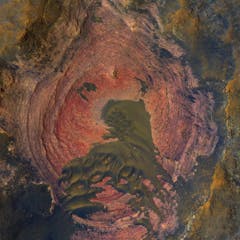
Articles on Aliens
Displaying 41 - 60 of 95 articles

If octopuses simply started evolving a smarter brain, what stops them from ruling over humans? Why has this not happened already? An expert explains what these cephalopods might be capable of.

Words matter, writes an immigration scholar. It is far easier to deny the humanity of an ‘alien’ than to do so for a ‘noncitizen.’

NASA’s Mars 2020 mission has arrived and landed the Perseverance Rover on the red planet. The rover’s goal is to collect rock and soil samples to be brought back to Earth in the future.

Aliens might want to contact us for the same reasons we are looking for them.

The sequel to 2018’s Occupation, this new alien invasion film is overly ambitious, both incomprehensible and shrill.

Scientists are not convinced by the current evidence of UFOs. That doesn’t mean that they don’t exist. But have Americans’ belief in UFOs gone from science to a new religion?

Considering what we know about the key ingredients for life’s formation on Earth, here are three explanations for how this process may have occurred on our sister planet.

The internet has allowed pseudoscience to flourish. Artificial intelligence could help steer people away from the bad information.

We asked astronomers: are we alone in the Universe? The answer was surprisingly consistent
The Conversation33.5 MB (download)
'I think that we will discover life outside of Earth in my lifetime. If not that, then in your lifetime,' one astronomer told us.

Somewhere out there, just maybe, an alien – probably stranger looking than in our wildest imagination – might be pondering this very question.

The Universe is mind-bogglingly large and with the latest technology, the search is only just starting to heat up.

It’s established Mars was once a planet with surface-level water. So with multiple MARS missions starting next year, the key to seeking out martian life may instead lie in the contents of its ‘dust’.

We haven’t heard anything from alien civilisations, but perhaps they’ve heard us.

CC BY-ND30.8 MB (download)
The fifth episode of the To the moon and beyond podcast series explores where we will be travelling in 2069.

As more than a million people have indicated plans to partake in a citizen ‘raid’ on the famed Area 51 to ‘see them aliens,’ a scholar on the search for extraterrestrial life weighs in on the hype.

Life could exist in another solar system in a different part our galaxy. Or in another galaxy far away. We don’t have the perfect technology yet to study such far away places but we’re still trying.

Sleep paralysis and exploding head syndrome can help explain things that go bump in the night.

The aliens of A Quiet Place track their prey by hearing something outside the norm.

If an alien landed on Earth, how would you decide if it had free will like us, or was a sophisticated automaton?

Crop circles are global phenomena gaining attention as paranormal culture becomes mainstream, along with a hybrid approach that emulates scientific investigation.





